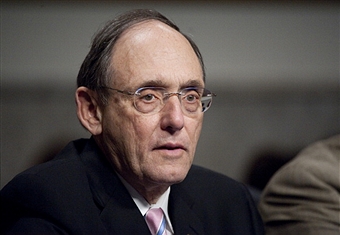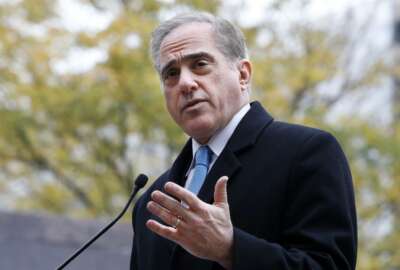

VA Secretary Shulkin's agenda for the upcoming year is full of initiatives across the department, from improving morale to implementing interoperability in health...
Veterans Affairs Secretary David Shulkin has one New Year’s resolution, and it’s a big one: find ways to run the VA better. His agenda for the upcoming year is full of initiatives across the department, from improving morale to implementing interoperability in health records to realigning infrastructure.
“I think this is really just the common-sense approach to beginning to say ‘Are there better ways to run government? Are there better ways to run the VA than simply continuing the past practices?’” Shulkin said on Agency in Focus: Veterans Affairs.
And not all of these initiatives are starting from scratch. VA has already begun working toward linking its health records with those of the Defense Department. Now he’s looking at taking that a step further, and integrating networks as well.
“As we each go out and develop networks of providers, is there a possibility of us developing networks of providers together, to expand options for both TRICARE beneficiaries as well as veterans so that you get to participate in large networks and easier to access care rather than having to do each of these programs separately?” Shulkin asked on the Federal Drive with Tom Temin.
Shulkin sees these kinds of opportunities for interdepartmental cooperation everywhere. Aside from integrating medical records and networks, he also wants to coordinate research with the National Institutes of Health, work closer with Public Health Service officers, and start purchasing supplies in a more integrated fashion.
There are also multiple initiatives he’s working on with Congress.
For one thing, Shulkin said it’s getting more difficult to find and hire qualified medical practitioners at VA medical centers, especially in areas where there aren’t larger medical schools. That’s why he’s working with Congress to create more medical graduation locations, and to institute a service-based repayment program for medical school loans.
He’s also working with Congress to find new authorities to help VA operate more efficiently. One large one is a potential review and closure process, like DoD’s BRAC (Base Realignment and Closure), to reduce VA’s inventory of underutilized and aging buildings. Shulkin said this would free up resources to allow VA to perform the necessary maintenance on its newer facilities.
“That means looking at how we’re using the facilities now. I’ve announced that I want to dispose of our underutilized and vacant facilities and reinvest that in our facilities that our veterans are being treated in and utilizing.”
Shulkin said medical facilities like hospitals, because they’re open 24/7, 365 days a year, suffer from more wear-and-tear than ordinary government facilities like office buildings. That means they ought to be revisited and revitalized roughly every 10 to 15 years.
Shulkin said Congress has already granted other authorities to VA, like the ability to expedite the firing of VA employees.
“I do believe that being able to remove people from the workforce who have not been constructive is going to result in those employees that remain feeling better about their jobs and improving their morale,” Shulkin said. “We are working hard to provide our workers with better quality facilities and tools and technology to allow them to do their jobs well. We know that if we take care of our workers, they’re going to take care of our veterans, and that’s ultimately what our mission is. So we’re very focused on making progress on the morale in the organization.”
Copyright © 2025 Federal News Network. All rights reserved. This website is not intended for users located within the European Economic Area.
Daisy Thornton is Federal News Network’s digital managing editor. In addition to her editing responsibilities, she covers federal management, workforce and technology issues. She is also the commentary editor; email her your letters to the editor and pitches for contributed bylines.
Follow @dthorntonWFED


